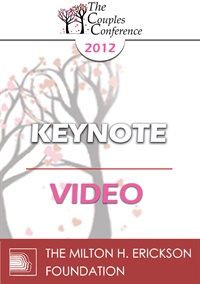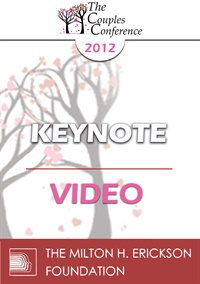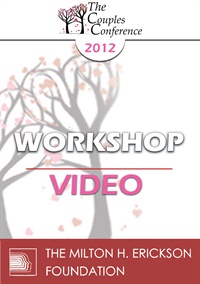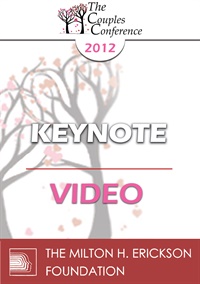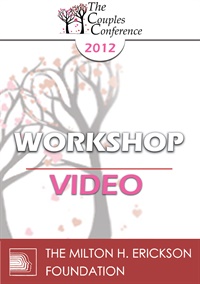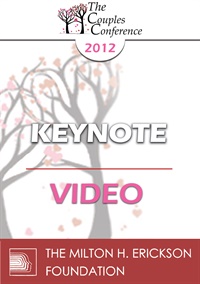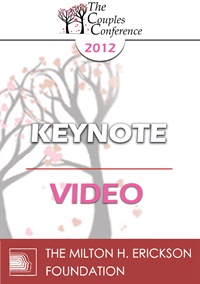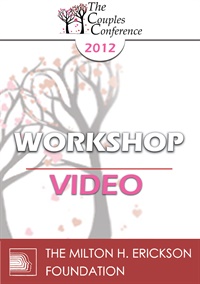- Average Rating:
- Not yet rated
- Topic Areas:
- Keynotes | Couples Therapy | Love | Neurobiology | Neuroscience | Relationships
- Categories:
- Couples Conference | Couples Conference 2012
- Faculty:
- Helen E. Fisher, PhD
- Course Levels:
- Master Degree or Higher in Health-Related Field
- Duration:
- 58:07
- Format:
- Audio and Video
- Original Program Date:
- Apr 29, 2012
- Short Description:
- Anthropologist Helen Fisher uses her brain scanning studies (fMRI) of people happily in love, rejected in love and in love long-term to discuss the traits of romantic love, love-at-first-sight, and addiction to love. She focuses on her current research on 40,000 men and women to propose that four broad cognitive/behavioral personality trait constellations have evolved associated with the neural systems for dopamine, serotonin, testosterone and estrogen. Then she discusses her data on mate choice among 28,000 individuals to pro-pose why we are chemically drawn to one person rather than another.
- Price:
-
Sale is $29.00
price reduced from Base Price - $59.00
- Average Rating:
- Not yet rated
- Topic Areas:
- Psychotherapy | Keynotes | Intimacy | Mindfulness | Love | Couples Therapy | Neuroscience
- Categories:
- Couples Conference | Couples Conference 2012
- Faculty:
- Rick Hanson, PhD
- Course Levels:
- Master Degree or Higher in Health-Related Field
- Duration:
- 59:50
- Format:
- Audio and Video
- Original Program Date:
- Apr 29, 2012
- Short Description:
- To compensate for the brain’s innate negativity bias – making it like Velcro for negative experiences but Teflon for positive ones, which sensitizes couples to hurts and conflicts and undermines psychotherapy – we’ll explore a vital method in self-directed neuroplasticity: identifying key positive experiences and then registering them deeply in implicit memory.
- Price:
-
Sale is $29.00
price reduced from Base Price - $59.00
- Average Rating:
- Not yet rated
- Topic Areas:
- Workshops | Love | Couples Therapy | Neurobiology
- Categories:
- Couples Conference | Couples Conference 2012
- Faculty:
- Helen E. Fisher, PhD
- Course Levels:
- Master Degree or Higher in Health-Related Field
- Duration:
- 1:35:03
- Format:
- Audio and Video
- Original Program Date:
- Apr 29, 2012
- Short Description:
- In her lecture, Fisher discusses four biologically based styles of thinking and behaving and, using her data on mate choice among 28,000 individuals, shows why we are chemically drawn to one person rather than another. In this workshop Fisher goes deeper into these natural temperament constellations, and discusses how partners with very different (and similar) biological styles of thinking and behaving interact to create great joy, confusion and sorrow in their partnerships.
- Price:
-
Sale is $29.00
price reduced from Base Price - $59.00
Tags: Love Couples Therapy Neurobiology
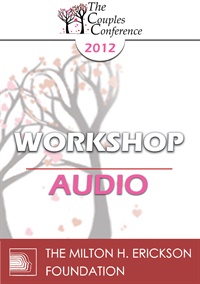
- Average Rating:
- Not yet rated
- Topic Areas:
- Emotionally Focused Therapy (EFT) | Workshops | Couples Therapy | Relationships | Therapeutic Relationship
- Categories:
- Couples Conference | Couples Conference 2012
- Faculty:
- Scott R. Woolley, PhD
- Duration:
- 1:26:46
- Format:
- Audio Only
- Original Program Date:
- Apr 29, 2012
- Short Description:
- Most couples have at least one partner who withdraws. To bring about lasting change, withdrawers have to engage in the process of therapy and most importantly they must reengage in the relationship. Using video examples, this workshop focuses on how to engage withdrawers and help them reengage with their partners.
- Price:
- $15.00 - Base Price
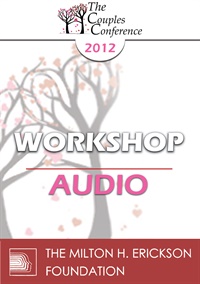
- Average Rating:
- Not yet rated
- Topic Areas:
- Workshops | Anger | Couples Therapy | Neurobiology
- Categories:
- Couples Conference | Couples Conference 2012
- Faculty:
- Rick Hanson, PhD
- Duration:
- 1:55:29
- Format:
- Audio Only
- Original Program Date:
- Apr 29, 2012
- Short Description:
- The first emotion our ancestors evolved was fear—and we remain highly threat reactive today, continually overestimating threats and underestimating opportunities and resources. We’ll explore multiple methods for helping clients “cool the fires” of fear and anger, and internalize inner strength and an appropriate sense of safety.
- Price:
- $15.00 - Base Price
Tags: Anger Couples Therapy Neurobiology
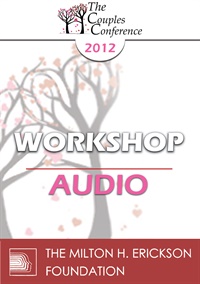
- Average Rating:
- Not yet rated
- Topic Areas:
- Workshops | Couples Therapy | Experiential Therapy
- Categories:
- Couples Conference | Couples Conference 2012
- Faculty:
- Rick Hanson, PhD
- Duration:
- 1:55:51
- Format:
- Audio Only
- Original Program Date:
- Apr 29, 2012
- Short Description:
- Building on the keynote on “taking in the good,” we’ll explore ways to use positive experiences to soothe and potentially replace negative material (e.g., relationship upsets, pain from childhood). Through discussion and experiential activities, we’ll match healing experiences to disturbances in the brain’s core motivational systems (Avoid harm, Approach reward, Attach to “us”).
- Price:
- $15.00 - Base Price
Tags: Couples Therapy Experiential

CC12 Workshop 14 – Focusing on Deficits in Couple Therapy: The PACT® Methodology – Stan Tatkin, PsyD
- Average Rating:
- Not yet rated
- Topic Areas:
- Workshops | Psychobiological Approach to Couples Therapy (PACT) | Couples Therapy | Mindfulness
- Categories:
- Couples Conference | Couples Conference 2012 | Pioneers in Couples and Family Therapy
- Faculty:
- Stan Tatkin, PsyD, MFT
- Duration:
- 1:51:28
- Format:
- Audio Only
- Original Program Date:
- Apr 29, 2012
- Short Description:
- This workshop explores how social-emotional deficits like alexithymia, affect blindness, and poor theory of mind disrupt co-regulation and erode relational security. Tatkin offers practical tools for assessing such deficits, distinguishing them from defenses, and guiding couples toward clearer emotional signaling, mutual understanding, and more accurate attribution under stress.
- Price:
- $15.00 - Base Price
- Average Rating:
- Not yet rated
- Topic Areas:
- Workshops | Affairs | Couples Therapy | Attachment | Attunement | Conflict | Gottman Method
- Categories:
- Couples Conference | Couples Conference 2012
- Faculty:
- John Gottman, PhD
- Course Levels:
- Master Degree or Higher in Health-Related Field
- Duration:
- 1:47:47
- Format:
- Audio and Video
- Original Program Date:
- Apr 29, 2012
- Short Description:
- The Atone-Attune-Attach model of couples’ therapy for healing from a revealed extra-relationship affair, with secrecy deception is described. Each of the three phases has 4 objectives. The roles of conflict avoidance and self-disclosure avoidance are discussed, as well as the Gottman-Rapoport conflict blueprint. To deal with attachment injuries and regrettable past incidents, the Gottman Recovery Kit is described. The Gottman-Rusbult-Glass cascade forms the basic theory for this therapy. The roles of cherishing and gratitude versus trashing and betrayal are discussed, as well as the theory of attunement and trust, and CL-ALT and betrayal.
- Price:
-
Sale is $29.00
price reduced from Base Price - $59.00
- Average Rating:
- Not yet rated
- Topic Areas:
- Infidelity | Couples Therapy | Topical Panels | Attachment | Clinical Psychology | Evolutionary Psychology | Relationships | Sex and Sexuality | Sociology
- Categories:
- Couples Conference | Couples Conference 2012 | Pioneers in Couples and Family Therapy
- Faculty:
- Ellyn Bader, PhD | Helen E. Fisher, PhD | John Gottman, PhD | Esther Perel, MA, LMFT
- Course Levels:
- Master Degree or Higher in Health-Related Field
- Duration:
- 55:04
- Format:
- Audio and Video
- Original Program Date:
- Apr 28, 2012
- Short Description:
- Experts explore the intricate landscape of infidelity, examining its psychological, evolutionary, and cultural dimensions. Top relationship researchers reveal groundbreaking insights into why affairs happen, their impact on couples, and the complex therapeutic approaches needed to heal relationships. A compelling examination of trust, betrayal, and human connection in modern partnerships.
- Price:
-
Sale is $29.00
price reduced from Base Price - $59.00
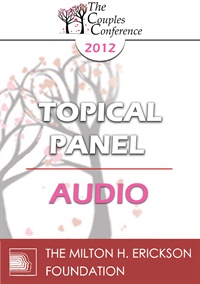
- Average Rating:
- Not yet rated
- Topic Areas:
- Attachment | Couples Therapy | Neuroscience | Topical Panels | Attunement | Therapist Development
- Categories:
- Couples Conference | Couples Conference 2012 | Pioneers in Couples and Family Therapy
- Faculty:
- Rick Hanson, PhD | Harville Hendrix, PhD | Stan Tatkin, PsyD, MFT | Scott R. Woolley, PhD
- Duration:
- 59:38
- Format:
- Audio Only
- Original Program Date:
- Apr 28, 2012
- Short Description:
- This panel explores how attachment theory and neuroscience shape couples therapy. It emphasizes the importance of secure bonds, therapist presence, emotional attunement, and brain-based insights into relational dynamics. Panelists examine how early attachment, brain function, and cultural context influence therapeutic effectiveness.
- Price:
- $15.00 - Base Price
- Average Rating:
- Not yet rated
- Topic Areas:
- Sex and Sexuality | Attachment | Couples Therapy | Keynotes | Intimacy
- Categories:
- Couples Conference | Couples Conference 2012
- Faculty:
- Esther Perel, MA, LMFT
- Course Levels:
- Master Degree or Higher in Health-Related Field
- Duration:
- 55:47
- Format:
- Audio and Video
- Original Program Date:
- Apr 28, 2012
- Short Description:
- Based on Perel’s Mating in Captivity, this bold take on intimacy and sex grapples with the obstacles and anxieties that arise when our quest for secure love conflicts with our pursuit of passion. We will tackle eroticism as a quality of aliveness and vitality in relationships extending far beyond mere sexuality and consider how the need for secure attachment and closeness can co-exist with the quest for individuality and freedom.
- Price:
-
Sale is $29.00
price reduced from Base Price - $59.00
- Average Rating:
- Not yet rated
- Topic Areas:
- Keynotes | Couples Therapy | Gottman Method | Attunement
- Categories:
- Couples Conference | Couples Conference 2012
- Faculty:
- John Gottman, PhD
- Course Levels:
- Master Degree or Higher in Health-Related Field
- Duration:
- 2:53:23
- Format:
- Audio and Video
- Original Program Date:
- Apr 28, 2012
- Short Description:
- Based on research, Gottman will discuss his new theory of how to conceptualize “trust” and “betrayal” using interdependence game theory. Trust and betrayal metrics here are not personality traits, but characteristics of daily interaction processes. He will present practical flowcharts for how couples build trust and loyalty, versus how couples build distrust and betrayal. The social skill of “emotional attunement” will be described precisely. A new therapy for preventing distrust and betrayal, and a therapy for healing from betrayal will be presented. Concepts will be illustrated with video-tape and transcripts from actual cases.
- Price:
-
Sale is $29.00
price reduced from Base Price - $59.00
- Average Rating:
- Not yet rated
- Topic Areas:
- IMAGO | Workshops | Communication | Couples Therapy
- Categories:
- Couples Conference | Couples Conference 2012
- Faculty:
- Harville Hendrix, PhD
- Course Levels:
- Master Degree or Higher in Health-Related Field
- Duration:
- 1:55:52
- Format:
- Audio and Video
- Original Program Date:
- Apr 28, 2012
- Short Description:
- Ever since Freud’s patient dubbed psychoanalysis a “talking cure,” most forms of therapy include someone talking to a professional. This workshop posits that therapy consists not so much in the action of talking but in the experience of how one is listened to while they talk, and that the more accurate name for successful therapy is the “listening cure.”
- Price:
-
Sale is $29.00
price reduced from Base Price - $59.00
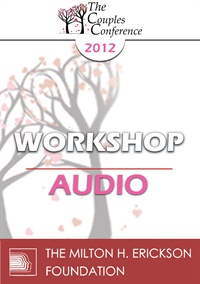
- Average Rating:
- Not yet rated
- Topic Areas:
- Couples Therapy | Workshops | Family Therapy | Blended Families | Family Systems | Parenting
- Categories:
- Couples Conference | Couples Conference 2012 | Pioneers in Couples and Family Therapy
- Faculty:
- William Doherty, PhD
- Duration:
- 1:58:12
- Format:
- Audio Only
- Original Program Date:
- Apr 28, 2012
- Short Description:
- Remarried couples are often poorly served by therapists who treat them without enough appreciation for the unique complexity and multiple loyalties of stepfamily life. This workshop will combine clinical assessment and treatment issues with a special focus on values issues, such as commitment and fairness that often dominate conflict in stepfamilies.
- Price:
- $15.00 - Base Price
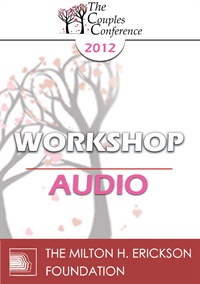
- Average Rating:
- Not yet rated
- Topic Areas:
- Workshops | Communication | Couples Therapy | Narcissism | Personality Disorders | Trauma | Behavioral Psychology | Developmental Therapy Model
- Categories:
- Couples Conference | Couples Conference 2012 | Pioneers in Couples and Family Therapy
- Faculty:
- Ellyn Bader, PhD
- Duration:
- 1:01:18
- Format:
- Audio Only
- Original Program Date:
- Apr 28, 2012
- Short Description:
- Couples come to therapy saying “we can’t communicate.” It sounds simple. Yet what does this really mean? Closer examination often reveals trauma, chronic hostility, narcissistic entitlement, or long-term conflict avoidance. And resolution requires internal self-development that may be resisted by one or both partners. This advanced workshop will use video segments to demonstrate the intricacies of resolving predictable communication breakdowns and supporting couples development.
- Price:
- $15.00 - Base Price
Tags: Communication Couples Therapy Narcissistic Personality Disorder Personality Disorders Trauma Communication Breakdown Differentiation Emotional Growth Emotional Vulnerability Experiential Learning Reframing Self-Accountability Self-Discovery Therapeutic Alliance Validation Vulnerability Emotional Maturity Emotional Risk
- Average Rating:
- Not yet rated
- Topic Areas:
- Couples Therapy | Keynotes | Intimacy | Relationships
- Categories:
- Couples Conference | Couples Conference 2012
- Faculty:
- Harville Hendrix, PhD
- Course Levels:
- Master Degree or Higher in Health-Related Field
- Duration:
- 59:12
- Format:
- Audio and Video
- Original Program Date:
- Apr 27, 2012
- Short Description:
- After 40-plus years of clinical experience and research, the contours of a healthy love relationship and core interventions are visible but not delineated. This lecture will posit the core features of a healthy relationship and the essential interventions necessary to help couples achieve one.
- Price:
-
Sale is $29.00
price reduced from Base Price - $59.00
- Average Rating:
- Not yet rated
- Topic Areas:
- Couples Therapy | Keynotes | Therapist Development | Ethical Practice | Family Systems | Family Therapy | Group Therapy | Systems Theory | Therapeutic Relationship
- Categories:
- Couples Conference | Couples Conference 2012 | Pioneers in Couples and Family Therapy
- Faculty:
- William Doherty, PhD
- Course Levels:
- Master Degree or Higher in Health-Related Field
- Duration:
- 57:04
- Format:
- Audio and Video
- Original Program Date:
- Apr 27, 2012
- Short Description:
- We have advanced training opportunities in couples therapy these days, but not a lot of training in the everyday skills of conducting sessions with couples who interrupt each other, flare at each other, mind read, and emotionally bail out of sessions. Here’s an hour’s worth of practical tools.
- Price:
-
Sale is $29.00
price reduced from Base Price - $59.00
Tags: Couples Therapy Therapist Development Change Resistance Clinical Ethics Family Rituals Family Values Group Dynamics Group Process Intergenerational Patterns Narrative Shifts Observation Ordeal Therapy Phenomenology Psychoeducation Relational Ethics Resistance Strategic Interventions Systems Theory Tailoring Therapeutic Alliance Therapist Presence Utilization
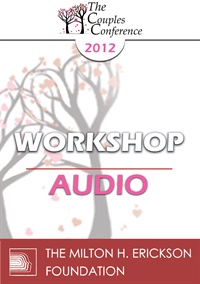
- Average Rating:
- Not yet rated
- Topic Areas:
- Attachment | Emotionally Focused Therapy (EFT) | Workshops | Couples Therapy | Relationships
- Categories:
- Couples Conference | Couples Conference 2012
- Faculty:
- Scott R. Woolley, PhD
- Duration:
- 1:53:34
- Format:
- Audio Only
- Original Program Date:
- Apr 27, 2012
- Short Description:
- Attachment injuries are a specific type of betrayal in romantic relationships that traumatize and fundamentally change basic relation-ship assumptions for injured partners and often create impasses in therapy. This workshop will present seven processes to restore love after an attachment injury and demonstrate elements of the healing process using video.
- Price:
- $15.00 - Base Price
- Average Rating:
- Not yet rated
- Topic Areas:
- Workshops | Couples Therapy | Therapist Development
- Categories:
- Couples Conference | Couples Conference 2012
- Faculty:
- Harville Hendrix, PhD
- Course Levels:
- Master Degree or Higher in Health-Related Field
- Duration:
- 1:59:16
- Format:
- Audio and Video
- Original Program Date:
- Apr 27, 2012
- Short Description:
- Some couples seem intractable and unchangeable, and their devotion to maintaining their misery seems mysterious. We often dread their next appointment. This workshop will demystify this well- known dynamic and describe and demonstrate concepts and processes that make working with the Couple-from-Hell joyful, even desirable.
- Price:
-
Sale is $29.00
price reduced from Base Price - $59.00
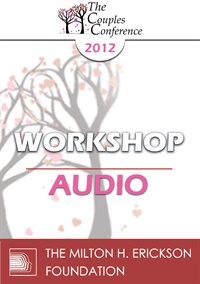
- Average Rating:
- Not yet rated
- Topic Areas:
- Infidelity | Workshops | Affairs | Couples Therapy | Intimacy | Sex and Sexuality
- Categories:
- Couples Conference | Couples Conference 2012
- Faculty:
- Esther Perel, MA, LMFT
- Duration:
- 1:48:13
- Format:
- Audio Only
- Original Program Date:
- Apr 27, 2012
- Short Description:
- Sexual infidelity often triggers a crisis that threatens the entire foundation of trust and connection in a couple. In this workshop, we’ll discuss the complexities of marriage, sex, intimacy, and monogamy in couples from a multicultural, nonjudgmental perspective. We’ll explore the motivations behind affairs and their possible meanings in different relationships, both heterosexual and gay. We’ll examine the benefits and costs of truth-telling and transparency, how couples can rebuild trust and intimacy, and why affairs can actually stabilize a marriage. With an eye on the existential, clinical and ethical aspects involved, we will focus on how our own assumptions, values, and personal experiences can influence our therapeutic work and elude the needs of the couple.
- Price:
- $15.00 - Base Price
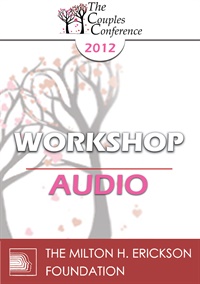
- Average Rating:
- Not yet rated
- Topic Areas:
- Divorce | Workshops | Couples Therapy | Marriage | Relationships
- Categories:
- Couples Conference | Couples Conference 2012 | Pioneers in Couples and Family Therapy
- Faculty:
- William Doherty, PhD
- Duration:
- 1:59:01
- Format:
- Audio Only
- Original Program Date:
- Apr 27, 2012
- Short Description:
- This workshop will identify the common mistakes in working with mixed-agenda couples (one leaning out and the other leaning in), and will teach you a protocol for “Discernment Counseling” to help clients make a decision that has integrity for all involved and that improves the odds that couples will try therapy to heal their broken bond.
- Price:
- $15.00 - Base Price
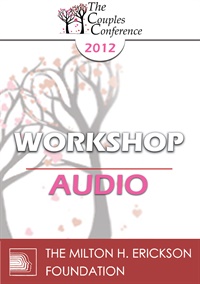
- Average Rating:
- Not yet rated
- Topic Areas:
- Couples Therapy | Workshops | Psychobiological Approach to Couples Therapy (PACT) | Psychotherapy | Communication
- Categories:
- Couples Conference | Couples Conference 2012 | Pioneers in Couples and Family Therapy
- Faculty:
- Stan Tatkin, PsyD, MFT
- Duration:
- 1:28:49
- Format:
- Audio Only
- Original Program Date:
- Apr 27, 2012
- Short Description:
- Introduces a psychobiological approach to couple therapy that shifts from insight-based to experiential methods. Using bottom-up techniques—like surprise interventions, movement, and the Lover’s Pose—therapists can access implicit systems through micro-expressions and body cues, helping couples regulate arousal, deepen attachment, and build secure-functioning relationships.
- Price:
- $15.00 - Base Price
- Average Rating:
- Not yet rated
- Topic Areas:
- Workshops | Couples Therapy | Intimacy | Sex and Sexuality | Conflict
- Categories:
- Couples Conference | Couples Conference 2012
- Faculty:
- Esther Perel, MA, LMFT
- Course Levels:
- Master Degree or Higher in Health-Related Field
- Duration:
- 1:54:46
- Format:
- Audio and Video
- Original Program Date:
- Apr 27, 2012
- Short Description:
- In this workshop, we will look at fantasy as an ingenious way our creative mind overcomes all sorts of relational and intra psychic conflicts around desire and intimacy. Therapists can help clients develop a view of fantasy as a narrative that creates a safe space to experience the pleasure that can invigorate their loving relation-ships. They will decipher the meaning of sexual fantasies, approaching them more as dreams or complex symbolic structures than as literal narratives of secret intentions.
- Price:
-
Sale is $29.00
price reduced from Base Price - $59.00
- Average Rating:
- Not yet rated
- Topic Areas:
- Keynotes | Attachment | Couples Therapy | Neuroscience | Differentiation | Developmental Psychology | Relationships
- Categories:
- Couples Conference | Couples Conference 2012 | Pioneers in Couples and Family Therapy
- Faculty:
- Ellyn Bader, PhD | Peter Pearson, PhD
- Course Levels:
- Master Degree or Higher in Health-Related Field
- Duration:
- 40:20
- Format:
- Audio and Video
- Original Program Date:
- Apr 27, 2012
- Short Description:
- A dynamic exploration of couples therapy that delves into neuroscience, attachment, and relationship growth. Bader and Pearson examine how brain survival instincts can impede connection. They introduce differentiation techniques and demonstrate how couples can overcome communication barriers through understanding, empathy, and collaborative teamwork. Engaging video demonstrations and a compelling case study illuminate the complex dynamics of intimate relationships.
- Price:
-
Sale is $29.00
price reduced from Base Price - $59.00
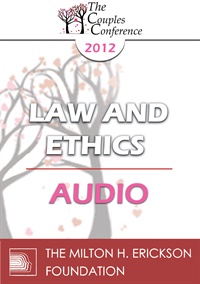
- Average Rating:
- Not yet rated
- Topic Areas:
- Law & Ethics | Therapist Development
- Categories:
- Couples Conference | Couples Conference 2012
- Faculty:
- A. Steven Frankel, PhD, JD, ABPP
- Duration:
- 3:41:58
- Format:
- Audio Only
- Original Program Date:
- Apr 26, 2012
- Short Description:
- This workshop in law, ethics and regulation focuses on three of the four most frequent causes for actions against mental health professionals, nationwide. Since the 2010-2011 law/ethics/regulation workshop focused primarily on boundary violations (including sexual contact between professional and patient/client), this 2012 -2013 workshop focuses on incompetence, criminal convictions and cases involving high conflict custody problems.
- Price:
- $15.00 - Base Price
Tags: Ethics Law Therapist Development


